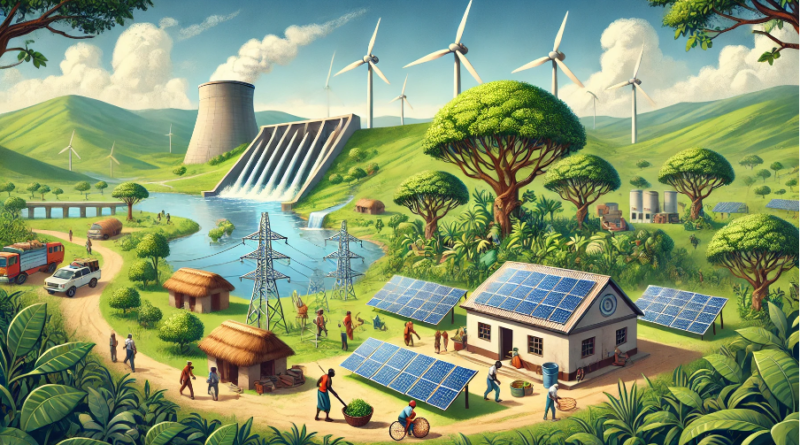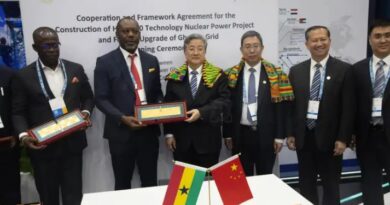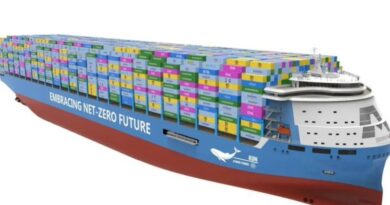Energy grids in Ghana and West Africa: Assessing access, reliability, and sustainability for actionable solutions
Have you ever stopped to think about the electricity that powers your home, your office, or even your mobile phone? For many of us, flipping a switch and seeing the lights come on feels almost automatic. Yet, for millions in Ghana and across West Africa, this basic necessity remains a persistent challenge—one that affects not just individuals, but entire communities and economies.
Picture this: Ghana, a nation of over 32 million people, has made significant strides in electrification, with access reaching 85%. Impressive, isn’t it? But dig a little deeper. In rural areas, only about half of households have electricity, while urban centres boast over 90% access (Energy Commission of Ghana, 2022). These gaps in access don’t just mean inconvenience; they represent missed opportunities for education, healthcare, and economic growth.
And then there’s “dumsor,” a term that has become all too familiar. For those in the dark—literally—power outages aren’t just an inconvenience; they’re a barrier to productivity, innovation, and prosperity. Imagine running a business where the power cuts out unpredictably, leaving you with idle machines and frustrated customers. Studies estimate that these outages cost Ghana’s economy $2.1 billion annually, a loss felt by everyone (World Bank, 2022).
But why does this matter to you? Whether you’re a student striving to study after dark, an entrepreneur with dreams of scaling your business, or a parent ensuring your family’s safety, the state of our energy systems affects us all. It’s not about pointing fingers but understanding that we each have a role to play. Governments, businesses, communities, and individuals must come together to seek solutions that balance energy access, reliability, and sustainability.
Energy Access – Bridging the Divide Access to electricity is not merely a convenience; it is a cornerstone of development. Yet, in Ghana and across West Africa, energy access remains uneven, revealing significant urban-rural disparities that hinder inclusive growth. While Ghana’s national electrification rate stands at an admirable 85%, only 50% of rural households enjoy the benefits of electricity, compared to over 90% in urban areas (Energy Commission of Ghana, 2022). This disparity reflects deeper socio-economic inequalities, where rural communities are left behind in a world increasingly reliant on energy-driven innovation.
Why does this gap exist? The challenges are multifaceted. Rapid population growth, which in Ghana averages 2.1% annually (World Bank, 2023), places immense pressure on energy infrastructure. Urbanization compounds the strain, with cities expanding faster than the grid can keep up. In rural areas, the story is different but equally daunting—low population densities and dispersed settlements make grid extensions costly and logistically challenging. These obstacles, if left unaddressed, risk widening the development gap between urban and rural areas.
The over-reliance on traditional energy sources such as firewood and charcoal in rural communities exacerbates the issue. Not only do these sources contribute to environmental degradation, but they also limit opportunities for economic advancement. Imagine a rural school without electricity—students studying by candlelight cannot compete equally with their urban counterparts who have access to modern learning tools powered by reliable energy.
How can we address this? Expanding energy access requires a balanced approach. Investment in renewable off-grid solutions, such as solar home systems and mini-grids, offers a viable path forward. Countries like Kenya have shown the potential of such solutions, with solar energy systems reaching over 3 million households as of 2022 (International Renewable Energy Agency [IRENA], 2022). Ghana and its neighbors can learn from this success, scaling similar initiatives to bridge the urban-rural divide.
But it’s not just about infrastructure. It’s about policy alignment, innovative financing, and community engagement. Public-private partnerships can accelerate progress, with governments creating the enabling environment and private entities delivering innovative, cost-effective solutions. As individuals, we can also advocate for policies that prioritize equitable energy distribution and support renewable energy adoption.
The journey toward universal energy access is not an easy one, but it is essential. In focusing on bridging the divide, we can ensure that no community is left in the dark—literally or figuratively.
We need to necessarily refer to the energy transition policy and a few directions it provides
Energy Reliability – The Pillar of Economic Stability
Reliable energy is the lifeblood of a thriving economy. In Ghana, however, the specter of “dumsor” (intermittent power outages) continues to undermine progress. Businesses halt operations, students abandon study sessions, and households endure the frustrations of darkness. The impact is far-reaching, with Ghana’s economy losing an estimated $2.1 billion annually due to unreliable electricity supply—a figure equivalent to 2% of its GDP (World Bank, 2022).
Energy reliability, or the lack thereof, goes beyond economic costs. It affects healthcare systems, where interrupted power can jeopardize life-saving treatments, and industries, where downtime means lost productivity. In global energy reliability indices, Ghana struggles to meet good standard metrics of power reliability such as SAIFI (System Average Interruption Frequency Index), SAIDI (System Average Interruption Duration Index) and CAIDI (Customer Average Interruption Duration Index), metrics that reflect the frequency and duration of power outages. While developed countries maintain interruptions as low as one hour per year, Ghana’s figures are significantly higher, revealing the gap in grid resilience and maintenance (Energy Commission of Ghana, 2023).
Energy reliability, or the lack thereof, goes beyond economic costs. It affects healthcare systems, where interrupted power can jeopardize life-saving treatments, and industries, where downtime means lost productivity. In global energy reliability indices, Ghana struggles to meet good standard metrics of power reliability such as SAIFI (System Average Interruption Frequency Index), SAIDI (System Average Interruption Duration Index) and CAIDI (Customer Average Interruption Duration Index), metrics that reflect the frequency and duration of power outages. While developed countries maintain interruptions as low as one hour per year, Ghana’s figures are significantly higher, revealing the gap in grid resilience and maintenance (Energy Commission of Ghana, 2023).
The root causes of unreliable energy supply in Ghana and West Africa are both technical and systemic. Among multiple factors are: aging and outdated infrastructure, limited capacity, high transmission and distribution losses, insufficient investment in grid modernization, over-dependence on fossil fuels, weak policy implementation, lacking enforcement on incentives and subsidies, environmental and climate factors, governance and rapid population growth.
These challenges, coupled with a centralized operating system create a fragile grid systems, prone to disruptions. Additionally, demand often outpaces supply during peak periods, leading to load shedding—a reactive, rather than preventive, approach to energy management.
Addressing these challenges requires strategic interventions. First, modernizing grid infrastructure with advanced technologies like AI, IoT and Cybersecurity all embedded in smart grid technologies and automated distribution systems can significantly enhance reliability. Smart grids, already in use in countries like India, reduce outages by detecting and responding to faults in real time. For example, Gujarat’s smart grid initiatives reduced power interruptions by 45% between 2018 and 2022 (IEA, 2023).
Second, diversifying energy sources can alleviate the strain on Ghana’s overburdened grid. Despite progress in renewable energy, its contribution remains limited. As of 2024, Ghana’s installed generation capacity reached 5,639 MW, with only 132 MW coming from solar energy sources. In 2022, Ghana’s total renewable energy capacity, including hydro and solar, was approximately 1,584 MW, representing a small fraction of the energy mix (Energy Commission of Ghana, 2024). Expanding this share is critical for not only improving grid reliability but also positioning the nation as a leader in sustainable energy transitions.
Third, consumer education and demand-side management are critical components in addressing energy challenges. Public awareness campaigns promoting energy conservation and efficiency can significantly reduce strain on the grid. For example, shifting heavy consumption activities, such as industrial operations, to off-peak hours can balance demand and optimize resource utilization. Ghana’s Energy Efficiency Awareness Campaign, initiated by the Energy Commission, is a noteworthy example of such efforts. Through this campaign, households were educated on using energy-efficient appliances, such as LED bulbs and energy-star-rated refrigerators, which led to measurable reductions in residential energy consumption. This underscores the potential impact of empowering consumers with knowledge and tools to make sustainable energy choices.
Fourth, policymakers must also take bold steps to incentivize private investments in energy storage systems, which are essential for stabilizing supply during periods of high demand. For instance, large-scale battery storage projects, such as Tesla’s Hornsdale Power Reserve in South Australia, have demonstrated how stored energy can offset peak-hour shortages and enhance grid reliability. While Ghana is yet to fully explore this technology, there have been encouraging moves, such as the deployment of solar battery systems in some off-grid communities under the Ghana Renewable Energy Development and Management Programme (REDP). Scaling such initiatives through public-private partnerships can bolster energy resilience, reduce outages, and pave the way for a more sustainable energy future. These examples highlight the importance of a concerted effort from policymakers, private investors, and consumers alike.
Energy reliability is not just a technical problem; it’s a shared challenge that requires coordinated efforts from all stakeholders. With the right investments and policies, Ghana and West Africa can transform their grids into engines of growth and resilience.
Energy Sustainability – Building a Greener Future
Sustainability lies at the heart of Ghana’s and West Africa’s energy ambitions, yet it remains an elusive goal. While progress has been made, the region’s heavy reliance on thermal power—accounting for over 60% of Ghana’s energy generation (Energy Commission of Ghana, 2023)—raises significant environmental concerns. Thermal plants, powered by oil and gas, contribute to greenhouse gas emissions, air pollution, and climate change, threatening the long-term viability of energy systems and natural ecosystems.
The cost of unsustainable energy practices is not just environmental—it’s economic. Ghana spends a significant portion of its national budget on fuel imports to power its thermal plants. In 2022 alone, fuel subsidies for energy generation cost the government $600 million (Africa Energy Outlook, 2023). These funds, if redirected, could catalyze investments in renewable energy infrastructure and innovation, offering a dual benefit of environmental conservation and economic resilience.
Renewable energy presents an untapped opportunity. Ghana’s geographical position offers immense potential for solar, wind, and hydroelectric power. For instance, the country receives an average solar irradiation of 4-6 kWh/m²/day, making solar energy a viable and abundant resource (International Renewable Energy Agency, 2022). However, despite this potential, renewables contribute less than 5% to the country’s energy mix.
The barriers to renewable energy adoption are significant but surmountable. High initial investment costs, limited access to financing, and inconsistent policy enforcement have deterred widespread adoption. Moreover, gaps in technical expertise and infrastructure development have slowed progress. Addressing these issues requires robust policies and innovative financing mechanisms.
The infusion of renewable energy technologies more suited to Ghana’s context, such as Concentrated Solar Power (CSP) and Green Hydrogen, holds immense potential for advancing energy sustainability in the region. CSP, which uses mirrors or lenses to concentrate sunlight to generate thermal energy, is particularly advantageous given Ghana’s abundant solar resources. Unlike traditional photovoltaic systems, CSP can incorporate thermal energy storage systems, enabling power generation even during non-sunny periods and thus addressing the intermittent nature of solar energy. For instance, Morocco’s Noor Ouarzazate Solar Complex has successfully demonstrated the viability of CSP for stable energy production and storage, serving as a model for similar projects in Ghana. Similarly, green hydrogen, produced through electrolysis powered by renewable energy, offers a clean and versatile energy carrier for multiple applications, including energy storage, transportation, and industrial processes. By leveraging surplus renewable energy to produce hydrogen, Ghana can store energy during periods of low demand and use it during peak demand or export it as a high-value commodity. Integrating these technologies into Ghana’s energy mix not only diversifies the energy portfolio but also enhances energy reliability and reduces carbon emissions, laying the groundwork for a sustainable energy future in West Africa.
Sustainability also hinges on technological innovation. Integrating artificial intelligence (AI) and Internet of Things (IoT) technologies into energy management systems can optimize energy use, reduce waste, and enhance reliability. Smart meters, for instance, enable consumers to monitor and adjust their energy consumption in real-time, fostering energy efficiency and cost savings. These technologies, along with advanced sensors, automation, and predictive analytics, converge into what is widely recognized today as the smart grid. It is our firm belief that the future of energy supply must prioritize the successful implementation of smart grid systems, which can dynamically balance energy demand and supply while integrating renewable energy sources.
Currently, the West African Power Pool (WAPP) is piloting an ambitious project to interconnect power generation and transmission companies across West Africa using smart grid concepts. This initiative aims to enhance energy trade, improve grid stability, and reduce power outages. However, progress has been limited due to several challenges, including inadequate infrastructure, lack of harmonized technical standards, insufficient investment, and gaps in technical expertise. To realize its full potential, this initiative requires greater focus and commitment from policymakers, regional bodies, and international partners. Addressing these obstacles will not only ensure the success of the WAPP smart grid project but also set the stage for a more resilient and sustainable energy future for West Africa.
Ultimately, the path to sustainability requires a shift in mindset. As individuals, adopting renewable energy solutions like solar panels and energy-efficient appliances can contribute to the collective effort. For policymakers, enforcing renewable energy quotas and providing subsidies for green technology adoption are critical steps. Together, these efforts can transition Ghana and West Africa toward a sustainable energy future
Financial and Policy Challenges – Unlocking Investment and Innovation
Financing and policy frameworks are the backbone of any successful energy sector, yet they remain significant bottlenecks in Ghana and West Africa. The region’s energy sector faces a dual challenge: insufficient funding for infrastructure development and ineffective policies that discourage private sector participation. Overcoming these challenges is critical to ensuring sustainable, reliable, and accessible energy for all.
One of the key financial hurdles is the reliance on donor funding and government subsidies. While donor funds have historically played a pivotal role in energy projects, they often come with limitations and conditions that impede long-term planning. In Ghana, subsidies for energy generation and distribution cost the government an estimated $600 million annually (Africa Energy Outlook, 2023). These subsidies, while providing short-term relief, distort energy markets and discourage private investment.
The electricity tariff structure further compounds the issue. Ghana’s tariffs are among the highest in sub-Saharan Africa, with residential rates averaging $0.14 per kilowatt-hour, compared to $0.07 in countries like Ethiopia (World Bank, 2022). High tariffs place a financial burden on consumers, yet the revenue generated is often insufficient to cover operational costs, let alone fund infrastructure upgrades. This disconnect highlights the need for a more balanced approach to tariff setting—one that ensures affordability for consumers while attracting investment.
Policy gaps also hinder progress. Inconsistent enforcement of energy regulations and weak institutional frameworks create uncertainty for investors. For instance, while Ghana’s Renewable Energy Act, passed in 2011, aimed to boost the share of renewables in the energy mix, implementation has been slow, with key provisions like feed-in tariffs remaining underutilized (Energy Commission of Ghana, 2023). Such lapses undermine confidence in the energy sector and deter both local and foreign investors.
Addressing these financial and policy challenges requires innovative solutions. First, leveraging public-private partnerships (PPPs) can unlock new funding sources. Successful examples include Ghana’s Independent Power Producer (IPP) model, which has attracted private investment for thermal and renewable energy projects. Expanding this model to include more renewable energy projects can accelerate progress.
Second, restructuring tariffs to reflect true costs while protecting vulnerable populations through targeted subsidies can balance affordability with financial sustainability. Countries like Rwanda have implemented progressive tariff systems, where higher-income households pay more, allowing cross-subsidization for low-income consumers.
Finally, strengthening policy enforcement and aligning national energy strategies with global frameworks is essential. Ghana can draw inspiration from South Africa’s Integrated Resource Plan (IRP), which provides a clear, long-term roadmap for energy development, prioritizing renewable energy and grid modernization.
The path forward requires collective effort. Governments must prioritize policy reforms and transparency, the private sector must embrace innovation and investment, and consumers must advocate for equitable energy policies. Together, these efforts can transform Ghana’s energy landscape into a model of financial sustainability and policy coherence.
Recommendations
Achieving a reliable, accessible, and sustainable energy sector in Ghana and West Africa requires a multidimensional approach. The first step is to expand the region’s renewable energy portfolio. Solar, wind, and hydroelectric power are abundant resources that remain underutilized and offer significant potential for transformation.
Additionally, technologies like Concentrated Solar Power (CSP), with its ability to provide thermal energy storage and continuous power generation, and green hydrogen, a clean energy carrier produced from renewable sources, can play critical roles. Investing in these alternatives not only diversifies the energy mix but also reduces reliance on thermal power plants and their associated environmental and economic costs, paving the way for a more sustainable energy future.
Modernizing energy infrastructure is equally critical. Many of the power outages experienced in the region stem from aging transmission lines and inefficient distribution networks. Implementing smart grid technologies can optimize energy flow, reduce transmission losses, and provide real-time insights into grid performance. Countries like India have demonstrated the effectiveness of these systems, significantly reducing power interruptions and enhancing grid reliability.
Regional cooperation can also play a transformative role. West Africa’s fragmented energy markets often hinder cross-border electricity trade. Strengthening regional integration through organizations like the West African Power Pool (WAPP) can create a unified energy market, enabling surplus energy from one country to be redistributed to meet deficits elsewhere. Such collaborations can also attract larger-scale investments, as they offer economies of scale and reduce risks for investors.
Building local capacity in advanced energy technologies is essential for long-term sustainability. Training programs in fields such as renewable energy engineering, energy policy, and smart grid management can empower local talent to take ownership of the energy transition. Governments and academic institutions must collaborate to create specialized courses and research programs that address the unique challenges of the region’s energy sector.
West African nations should prioritize the adoption and effective implementation of smart grid technologies as a cornerstone for enhancing energy efficiency and sustainability. Leveraging technological innovations such as artificial intelligence (AI) and the Internet of Things (IoT) can revolutionize energy management systems in the region. AI-driven solutions should be integrated to predict energy demand accurately, optimize supply chains, and improve maintenance schedules for critical infrastructure, ensuring reliability and cost-effectiveness. Additionally, IoT-enabled smart meters should be deployed to empower consumers with real-time monitoring and control over their energy consumption, reducing waste and lowering costs.
At the policy level, aligning national energy strategies with global standards is crucial. This includes enforcing renewable energy targets, implementing transparent regulations, and ensuring accountability in energy governance. Policies must also incentivize private investment in renewables and grid modernization. A well-regulated energy sector instills confidence among investors and attracts the resources needed to drive transformation.
Collectively, these measures require a shared commitment from governments, the private sector, and civil society. In prioritizing investments in renewable energy, embracing technology, and fostering regional collaboration, Ghana and West Africa can overcome their energy challenges. The journey toward a brighter energy future is not without obstacles, but with coordinated efforts and visionary leadership, it is an achievable goal.
Conclusion
The energy sector in Ghana and West Africa stands at a critical juncture, with access, reliability, and sustainability serving as interconnected challenges that demand urgent attention. The region’s aspirations for economic growth and social development cannot be fully realized without a robust energy infrastructure that powers industries, educates communities, and sustains livelihoods.
As this article has explored, energy access remains uneven, with rural areas disproportionately affected. The recurring power outages that characterize “dumsor” continue to hinder economic stability and productivity, underscoring the need for a reliable energy supply. Furthermore, the reliance on thermal power and its environmental costs highlight the pressing need to transition toward sustainable energy solutions. However, the financial and policy gaps present significant barriers that must be addressed to create a more inclusive and efficient energy system.
Solutions are within reach. Investing in renewable energy, modernizing grid infrastructure, fostering regional collaboration, and leveraging technology are critical steps toward transforming the energy landscape. Equally important is the role of policy reforms in creating an enabling environment for private sector participation and innovation. But success requires more than technical solutions—it demands a collective effort.
Ultimately, the journey toward an equitable and sustainable energy future is one that involves every stakeholder. Ghana and West Africa have the resources, talent, and potential to rise above these challenges. In prioritizing action today, the region can illuminate not just homes and businesses but also the path toward a more prosperous and resilient future for all. The light we seek lies in our shared determination to create an energy system that works for everyone—one that powers not only economies but also possibilities.
*****
Authors
Engr. Prof. Amevi Acakpovi is a distinguished Professor in Electrical and Energy Systems Engineering, the Vice-Chancellor (Ag) of Accra Technical University (ATU), and the current President of the IEC National Committee of Ghana. He is a Fellow Professional Engineer with the Institution of Engineering and Technology and a Senior Member of IEEE.
His research focuses on Hybrid Energy Systems, and Smart Grid Modelling. He has authored over 130 publications in top journals and conferences and has been a guest speaker and reviewer for several respected journals and conferences.
Dr. David King Boison, Senior Research Fellow at the Center for International Maritime Affairs Ghana (CIMAG), is a distinguished academic, consultant, and CEO of Knowledge Web Centre, specializing in Blue Economy, Maritime and Port Operations & Logistics, IT, supply chain management, and Artificial Intelligence.
With dual PhDs in Port Operations and Business Administration and two MSc degrees with distinction from Coventry University, he is the Lead Consultant for the Ai Africa Project, which aims to train 11 million Africans in AI technologies.
A Senior Visiting Lecturer at Wigwe University, Rivers State, Nigeria, he is also recognized for pioneering Ghana’s e-port system (now the Paperless Port System).
He has authored numerous peer-reviewed papers and white papers on the Blue Economy, maritime trade & Port Operations, AI, fintech, and digital currencies, and has written two books.
Source: myjoyonline.com




